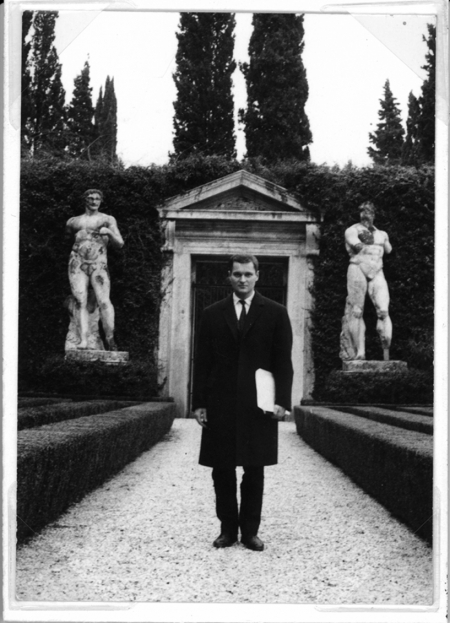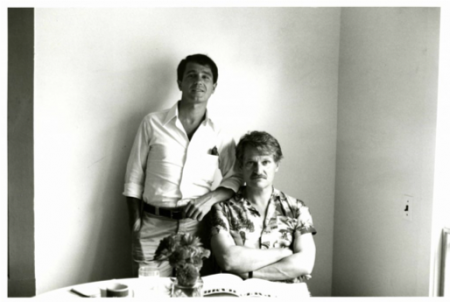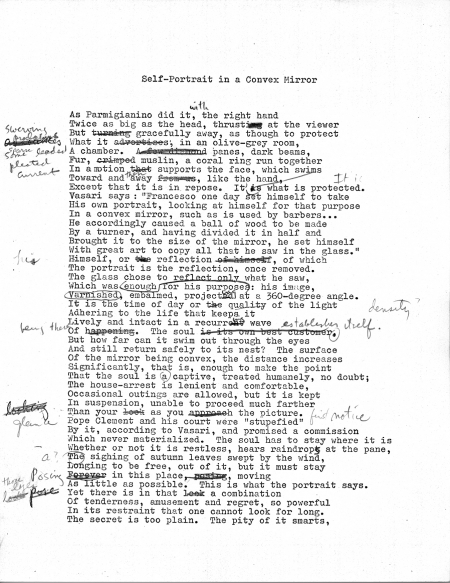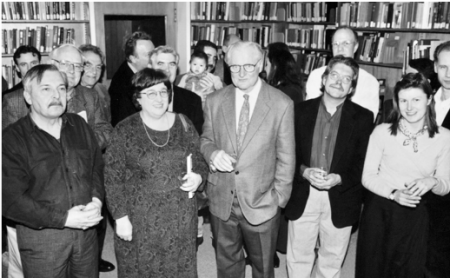CAMBRIDGE, MA — Just as the publication of John Ashbery’s The Double Dream of Spring (1970) helped cement the poet’s post-Tennis Court Oath reputation, the double presence at Houghton Library of John Ashbery’s papers and the John Ashbery Reading Library promises to do the same for generations to come.

“Ashbery’s papers are one of the pillars of Houghton’s American poetry collection, along with T. S. Eliot, Wallace Stevens, and Robert Lowell,” states Leslie Morris, Gore Vidal Curator of Modern Books and Manuscripts, at Harvard University’s Houghton Library.
Houghton’s acquisition of Ashbery’s manuscripts and correspondence began over 30 years ago in 1986, and the final posthumous shipment of papers occurred in December 2018. Occupying more than 250 linear feet of shelf space, the papers include manuscripts of all Ashbery’s work, from Some Trees to Commotion of the Birds: New Poems, including multiple working drafts. His correspondence also provides a rich research resource, including letters from fellow poets Frank O’Hara, Kenneth Koch, James Schuyler, and Barbara Guest; and artists such as Joe Brainard, Nell Blaine, and Jane Freilicher.
Shortly after Ashbery’s death in 2017, his husband David Kermani approached the Woodberry Poetry Room (located in Lamont Library and overseen by Houghton Library) with the generous offer to donate Ashbery’s extensive library to its collection.

The Ashbery Reading Library, which will be housed at Houghton and overseen by the Poetry Room, constitutes over 5,000 books of poetry and literature, art and film criticism, architectural history, philosophical and religious inquiry, travel literature, and cookbooks collected by Ashbery over the course of his lifetime. The donation also includes selected objects—among them, one of Ashbery’s typewriters and the collage, “Children at Play,” that hung above his Chelsea writing desk for over 25 years.
According to Poetry Room curator Christina Davis, “Ashbery’s reading library is not only a compelling showcase of his eclectic and enduring curiosities but stands, in many ways, as one of his consummate works of art, one that he constructed with great care over the course of many decades. During his lifetime, it was also a vital artery in his writing life and served as a kind of early and intimate Internet, from which he drew ideas and felicitous bits of data on a regular basis.”
Some highlights from the John Ashbery Reading Library include:
- Highly annotated editions of such authors as Boris Pasternak, Franz Kafka, Paul Klee, Friedrich Nietzsche, and Henri Michaux
- His undergraduate copy of the Oxford Book of American Verse (with pressed flowers inserted as bookmarks beside such poets as Emily Dickinson, Wallace Stevens, and William Carlos Williams)
- A series of Plotto editions which, according to David Kermani, inspired such poems as “Can You Hear, Bird.”

Many of the books feature Ashbery’s inimitable marginal markings as well as affectionate and whimsical inscriptions from such friends as Robert Duncan, Ronaldo Jonson, Kenneth Koch, Harry Mathews, Tom Raworth, Mark Strand, Trevor Winkfield, and Dara Wier.
“To scholars of Ashbery and late twentieth-century poetics,” Ashbery biographer Karin Roffman states, “the value of keeping these books together—as he did—and near his manuscripts and correspondence—as he also did—will be revelatory.”
In addition to the reading library, the Poetry Room has helped coordinate Kermani’s donation of one of Ashbery’s desks to Harvard University. Through a collaboration with Adams House, and with the generous support of the family of Seamus Heaney, Ashbery’s beloved “Lawrence desk” (the desk he inherited from his grandfather Henry Lawrence) will be installed in Adam House’s Heaney Suite, where undergraduates will be encouraged to create their own works.
Ashbery’s Harvard ties were deep, beginning with his time as an undergraduate (class of 1949), where he began life-long friendships with fellow poets Frank O’Hara, Kenneth Koch, Barbara Guest, and Robert Creeley, and gave his very first poetry reading at the Woodberry Poetry Room. His interest in poetry was nurtured by attending campus poetry readings by W.H. Auden, William Carlos Williams, Marianne Moore, T.S. Eliot, and Wallace Stevens, and he chose to write his senior honors thesis on Auden. And Auden just happened to be the judge who awarded Ashbery the Yale Younger Poets Prize for Some Trees, an award that launched Ashbery’s career.

In 1951, the Woodberry Poetry Room made the earliest extant recording of Ashbery’s work, when his one-act play Everyman premiered in Cambridge, Mass., under the auspices of the Poets’ Theatre. He was generous in giving many readings on campus as his fame grew. In 2000 he delivered the prestigious Norton lectures at Harvard and received an honorary doctorate from the University in 2001. He was awarded the Harvard Arts Medal in 2009, and the Harvard Film Archive celebrated “John Ashbery at the Movies” with the poet’s commentary on some of his favorite films. In 2014, John Latouche’s film “Presenting Jane” (1952), which features early film appearances by John Ashbery, Frank O’Hara, James Schuyler, and Jane Freilicher, was donated to the Poetry Room by cinematographer Harrison Starr.
Harvard is honored to continue this long and steadfast accompaniment of Ashbery’s work into the future.
“We are thrilled to add John Ashbery’s papers and reading library to our poetry holdings,” says Thomas Hyry, Florence Fearrington Librarian of Houghton Library, “and we look forward to seeing generations of scholars, writers, students, and others engage with and learn from Ashbery’s life and work.”
Images available on request:
1. John Ashbery in Rome at the Villa Madama. Photo by Fersinando Sacco, 1963. From the John Ashbery papers (*89M-58, box 49), Houghton Library, Harvard University.
2. David Kermani and John Ashbery. Photograph by Clarice Rivers, Summer 1977. © Clarice Rivers. From the John Ashbery Papers, (*89M-58, box 49), Houghton Library, Harvard University.
3. John Ashbery. “Self-portrait in a Convex Mirror,” typescript with autograph changes, ca. 1974. John Ashbery papers, Houghton Library, Harvard University. © 1974, 1975, 1985, 2008, 2019 Estate of John Ashbery. All rights reserved.
4. John Ashbery’s 70th birthday celebration at the Woodberry Poetry Room, 1997. Photographer unknown. From the Woodberry Poetry Room records, Houghton Library, Harvard University.